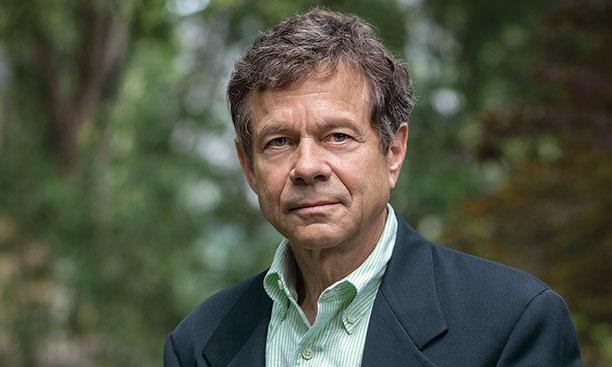
On a trip to Southeast Asia in the early 2000s, theoretical physicist and writer Alan Lightman ’70 met Veasna Chea, a Cambodian woman in her 30s who had spent her undergraduate years living in a muddy crawl space underneath her university building in Phnom Penh. There were ample living spaces available for male students, but there was no housing for women.
Lightman, the Professor of the Practice of the Humanities at the Massachusetts Institute of Technology and a prolific author, was inspired by Chea’s story to start the Harpswell Foundation, which built two dormitories offering a total of 80 female university students free room and board. The dorms include an in-house academic program in critical thinking and leadership for these women on topics such as analytical writing, civic engagement, and debate. Within two years of the dormitories’ construction, female residents were topping their classes across major universities in Phnom Penh. With the help of his former Princeton roommate, retired Malaysian politician Koh Tsu-Koon ’70, in 2017, Lightman started the Harpswell ASEAN Program in Women’s Leadership, a two-week intensive critical-thinking and leadership program for young professional women conducted in Penang, Malaysia. Lightman spoke to PAW about Harpswell’s ongoing mission.
Why did you focus on women?
There are many places where women are discriminated against — in every country — but the situation is very bad for women in Southeast Asia. When I began learning more about the situation of women in the world, I found that the most effective way to help developing countries is to empower and educate women. For the simple reason of not having a place to live, many women in Cambodia are prevented from [obtaining a] higher education.
Why did you choose critical-thinking skills for the program’s curriculum?
Critical thinking is lacking in most Asian education. Things are changing now, of course, but for many decades the Asian model was rote memorization that was not based on critical thinking. The reason our students were first in their classes within two years was, I think, because we gave them critical-thinking skills that put them way ahead of their classmates.
How has Harpswell changed lives?
I have many, many letters from our graduates saying how much they benefited from living in our dorms for four years. They are uniformly appreciative of what they learned in our program. We also know that, on average, our graduates earn five to 10 times the salary of the average woman in Cambodia. Finance is only one way to measure success — our students go back to their own villages and encourage girls to have ambition. You need role models.
Does the program relate to your other work as a physicist and writer?
It relates to my work as a human being. My training as a physicist helped me create the curriculum in critical thinking, and my work as a writer probably helped me design the humanities portion of the curriculum. But I think mainly it’s just part of being a human being. Especially those of us who have privilege, opportunities — I think we have an obligation to help other people who have less advantage.
How do you select participants for the programs in Cambodia and Malaysia?
We visit about 50 [Cambodian] high schools in May and June, and we interview only the top academic four [in each high school], so that gives us a pool of 200 people. We ask them to write essays, look at their extracurricular activities, and on the basis of that, try to evaluate their leadership potential.
For Malaysia, we have contacts with various NGOs, universities, and friends in each of the ASEAN countries, and we have those people make nominations to us. This is not just an academic journey—we’re looking for doers who are active, independent, willing to challenge the systems.
In June and July 2018, the foundation conducted its second run of the Harpswell ASEAN Program in Women's Leadership in Malaysia. How did that go?
It was exhilarating to see the women not only taking in the training, but forming bonds with each other. You could see that these women were supporting each other. We talked about the situation in each of their countries, their personal story. The world is in terrible shape right now, leaning back towards the right and populism and dictatorship, and these 25 women from Southeast Asia were [talking about] their hopes, and [demonstrating] their intelligence and fire to make change in the world — it gave me optimism for the future.
How do you measure the Harpswell Foundation's impact?
I don’t think we’re going to be able to measure the impact of our program for another 10 years. The real measure of success is whether our graduates will be able to change their societies, and you don’t change a society quickly. Education is always a very long time horizon.
Interview conducted and condensed by Tara Thean
This is an expanded version of the interview published in the Dec. 5, 2018, issue.
